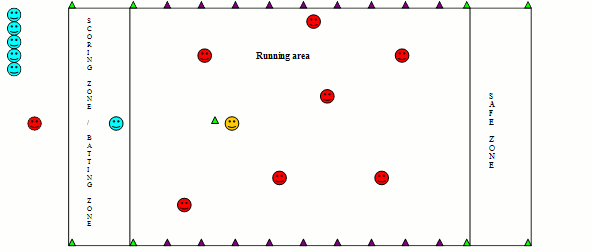Rules of Danish Longball: Difference between revisions
No edit summary |
No edit summary |
||
| (One intermediate revision by the same user not shown) | |||
| Line 1: | Line 1: | ||
Danish Longball is an informal longball variant played widely in schools in Denmark, Sweden and Britain, as well as by Scout groups and in some American summer camps | |||
-------------------------- | |||
<br> | |||
[A] From Outstanding PE Preparation (UK) | [A] From Outstanding PE Preparation (UK) | ||
[[File:Danish Longball Diagram.gif]]<br> | [[File:Danish Longball Diagram.gif]]<br> | ||
| Line 43: | Line 48: | ||
A player is out if : | A player is out if : | ||
the hit is caught by one of the fielding team | :the hit is caught by one of the fielding team | ||
the ball does not touch the ground in the marked area | :the ball does not touch the ground in the marked area | ||
:one of the fielders hits a runner with the ball. | |||
player runs outside the side lines of the square. | :a player runs outside the side lines of the square. | ||
Latest revision as of 12:29, 8 March 2016
Danish Longball is an informal longball variant played widely in schools in Denmark, Sweden and Britain, as well as by Scout groups and in some American summer camps
[A] From Outstanding PE Preparation (UK)

DANISH LONGBALL
Aim:
The aim of the game is to ‘bat’ the ball and run to the safe zone and back to the scoring zone to score a point. Batters are allowed to ‘bat the ball anywhere forward of the batting zone but must run inside the boundary markers.
Start of game:
All batters must line up away from the field of play.
The ball is bowled under arm to the batter who then must make contact.
Rules of the game:
Batting
Batters must attempt to hit the ball in a forward direction. Any unintentional hits backward are deemed legal. Once they have taken their turn they have 2 options. They can either run straight away to the ‘safe zone’ or remain in the ‘batting zone’ and run when an opportunity arises. Whilst waiting in these zones they cannot get out. There is no limit to the number of players allowed in each zone.
Fielding
Once the ball has been hit the fielders have to retrieve the ball. Once in the hands they are not allowed to move with the ball. They are allowed to throw the ball to a team-mate in order to get a batter out who is the running area.
To get a batter out a fielder may throw the ball at the individuals who are in the running zone. It must hit them below the waist.
A fielder is allowed to move to catch a ball. If a ball in caught in flight then all the players in the team are out and innings ends.
Scoring:
To score a point a batter has to enter the safe zone and return to the scoring zone – this can be completed at any time.
Fielders are not allowed to obstruct the running batters in any way. This will result in 1 run being awarded.
Once 3 players are struck with the ball then the innings ends.
There is no limit to the number of innings as games will be timed.
[B] From Topend Sports (UK)
Danish Longball
Danish longball, which is also called Swedish longball, is a bat and ball game developed in Denmark.
Danish longball is like a combination of baseball and cricket. Each team alternately takes turns in batting and fielding. In some games, a rule from dodgeball is incorporated, where the player can be considered “out” if he or she is hit with the ball.
The equipment used are: a tennis ball or a football, bat or tennis racket and safety pads.
The players in this sport are split into two teams, a fielding team and a batting team.
The bowler throws the ball to the batter, who hits it with his bat. The ball must be hit within the field of play. The batter runs to the other side of the square to a "safe zone", where he can rest in safety, but has to make it back to the original side of the aquare to earn a "run".
A player is out if :
- the hit is caught by one of the fielding team
- the ball does not touch the ground in the marked area
- one of the fielders hits a runner with the ball.
- a player runs outside the side lines of the square.